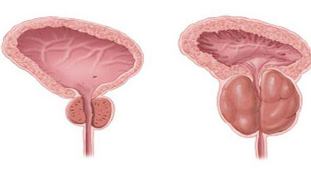Inflammation of the gland of the prostate, unfortunately, is quite common disease. According to statistics almost half of men in some years of experience of this problem. The causes of the inflammation can be different, but because in modern medicine, there are several types of this disease. One of them is bacterial prostatitis.

Due to a large diffusion of the disease in many men are interested in more information about him. What are the causes of bacterial infections inflammation? What symptoms should pay attention to? That the modern methods of treatment are the most effective?
What is prostatitis? The main forms of the disease
Before considering the question of what is bacterial prostatitis, is of opinion, that it is a gland of the prostate, or prostate cancer. This is a small organ which is part of the reproductive system. It is located slightly below the bladder, around the urethra. The prostate produces up to 70 percent of the seminal fluid, which is then mixed with the sperm that is produced in the testes. The gland of the prostate also plays a role in the process of release of sperm and maintains the erection. It also affects the retention of the urine.
Prostatitis — a disease that is accompanied by an inflammatory process in the prostate tissue. Depending on the reasons for the development of modern medicine there are several main types of the disease:
- acute bacterial prostatitis — an inflammation in this case develops due to infection with organ specific bacteria (eg, chlamydia, gonorrhea, etc.);
- the chronic form of bacterial prostatitis usually develops on the background of the inadequate use of care or its absence (for illness lasting more than three months, a period of prosperity gives way to the exacerbations of the inflammatory process);
- nonspecific prostatitis is the inflammatory process in this disease is caused by the activation of conditionally pathogenic microflora, or is not associated with bacterial infection;
- asymptomatic inflammatory prostatitis occurs without obvious symptoms, and very often, the inflammatory process of the decline itself.
Causes of bacterial prostatitis
As the name suggests, an inflammatory process in this case is related to the activity of bacteria (micro-organisms. The pathogens of bacterial prostatitis very often penetrate into the tissue of the prostate when the patient has sexually transmitted infections. Virtually all sexually transmitted diseases (e.g. gonorrhoea, chlamydia) can lead to a swelling of the prostate.
The middle-aged men as the causative agent can act and conditionally pathogenic microorganisms, such as Escherichia coli. A slightly different pattern is observed in elderly patients. The fact that many men over the age of 50 years diagnosed with so-called benign prostatic hyperplasia (accompanied by the growth of tissue). When this pathology of the evacuation of secretory fluid from the prostate is hampered, causing it begins to accumulate within the gland. The stagnation of secretions leads to active reproduction of pathogenic microorganisms and, consequently, inflammation.
Bacterial prostatitis may develop on the background of the different pathologies of the system, urogenital. For example, the inflammation is much more frequently diagnosed in the background of the obstruction of the bladder, urinary tract infection, epididymitis, urethritis. The diffusion and penetration of infection inside it promotes phimosis (the foreskin splicing). Cause a swelling of the prostate can be of various injuries of the perineum, the installation of a urinary catheter, prior to perform cystoscopy (internal examination of the bladder) or a biopsy.
There are risk factors?
As you can see, the causes of the inflammation of the prostate may be different. In addition, there is a group of the so-called risk factors, the presence of which increases the likelihood of both acute and chronic prostatitis:

- frequent infectious diseases of the genitourinary system;
- parasitic diseases;
- incomplete emptying of the bladder;
- the genetic predisposition;
- the irritation of the urinary canal aggressive chemical;
- severe hypothermia;
- promiscuous (frequent change of sexual partners, sexual relations without condom);
- No, use of drugs and alcohol (weakens protective forces of an organism);
- a weakened immune system;
- long periods of abstinence;
- severe dehydration of the body;
- the wrong food;
- neurological diseases urinary tract;
- constant stress, nervous exhaustion, emotional stress;
- a sedentary lifestyle leads to stagnation of blood in the pelvis (increasing the probability of inflammation, not only of the prostate, but also some other nearby organs).
What are the symptoms that accompany the disease?
Signs of bacterial prostatitis, as a rule, very characteristic. The disease begins acutely and develops quickly. Often the patients of the first note of the increase in body temperature, weakness, body pains, fatigue, muscle pain, nausea and vomiting.
Along with this, there are problems with the urinary system. The process of urination becomes difficult and painful, ask most frequent. However, the bladder is not completely emptied. Stream when urinating becomes weak, the urine acquires a rather unpleasant smell. Also, it may be a small amount of impurities in the blood. Can cause pain and burning in the urethra.
Patients often note and the other symptoms of bacterial prostatitis. In particular, there is pain in the pubic area, which also gives the lower part of the back. You may experience pain in the testicles and the perineum area. Men have problems with erection and ejaculation is accompanied by sensations. At times the semen can be seen traces of blood. Also have pain during bowel movements.
Realizing how the symptoms that you should consult immediately with a doctor. As soon as the patient will receive the proper medical attention, the lower is the probability of transition of the disease into a chronic form.
Chronic bacterial prostatitis
Immediately it should be noted that this form of the disease is very rare. Chronic bacterial prostatitis may be associated with the activity of bacteria that are protected from the effects of the drug, as it is located deeply in the tissues of the prostate. In addition, some microorganisms become insensitive to antibiotics, a wide range of impacts.
Exacerbation of chronic bacterial prostatitis is accompanied by nearly the same symptoms as the acute form of the disease. Observe the pain in urinating, pain in the abdomen and the perineum, blood in the urine and the semen. On the other hand, the temperature increase and other signs of poisoning are rare. Exacerbation followed by a period of relative prosperity — the man feels well, but some irregularities in the system urogenital still exist. In particular, the patients suffer from the need to urinate. Also have problems with an erection (sometimes to the point of severe erectile dysfunction) and decreased sexual desire.
The diagnosis of the disease
For a start, the doctor performs a physical examination and collecting a medical history, in order to obtain a complete picture of the symptoms that are bothering the patient. In general, this is enough to suspect prostatitis and order additional tests.

The patient passes to the blood and urine samples, an analysis that helps to detect the markers of inflammation. You also need a digital rectal examination of the gland of the prostate, which makes it possible for the doctor to determine the size, outline, consistency, body, degree of pain and some other parameters. In addition, during the massage of the prostate to obtain samples of his secret, which is sent to a laboratory for analysis. Seeding of samples help to determine the type of infection and the degree of sensitivity to certain drugs.
Further examination should be carried out only if there is suspicion of the presence of complications. With the cystoscope, the doctor can inspect and assess the condition of the urinary canal and bladder. Sometimes performs urodynamic tests. The ultrasound Transrectal and computed tomography help us to better understand the disease of the prostate, to detect the presence of abscesses or stones. For suspected malignant degeneration of cells biopsy of the prostate.
Drug treatment of prostatitis
After conducting a full examination, the doctor will be able to make the most effective scheme of therapy. As a general rule, in the first place, the treatment of bacterial prostatitis with antibiotics. In particular, a very effective antibacterial agents are medications that contain tetracycline and ciprofloxacin. Depending on the severity of the disease and the variety of the infection, antibiotic therapy can last from four to six weeks. Sometimes, in the early days of the medication is injected, and then move on to tablet form. In the form of chronic inflammation of treatment can last up to 12 weeks.
Use other drugs for the treatment of bacterial prostatitis. In particular, in order to facilitate the patient's condition can antispasmodics to help relax the neck of the bladder and reduce the pain during urination.
If necessary, the patient is prescribed drugs analgesics, namely nonsteroidal anti-inflammatory agents that help eliminate the fever. A positive effect on the state of men will be affected by the taking of a multivitamin complex, immunomodulators, biostimulants.
Other treatments
During the recovery phase patients often recommend a prostate massage. This procedure helps to eliminate the fluid retention, improving tissue metabolism, improving immunity local, restore drainage function of the prostate and improve the flow of blood.
Also in the process of treatment can be used various methods of physiotherapy, in particular:
- magnetic therapy;
- transrectal ultrasonic therapy;
- the electric stimulation.
All the above methods help to normalize the blood circulation and eliminate stagnant processes.
When surgical intervention is necessary?
The surgery is an extreme measure. Applies only in the case of the long duration of medical therapy and other treatments have no effect. Surgical procedure for the resection part of the prostate is, as a general rule, patients of advanced age. At an early age as a radical treatment to try to avoid, because it sometimes leads to impotence and sterility. The surgery is most often prescribed to elderly patients with chronic forms of prostatitis, because they have many years to suffer from problems with urination and constant pain. In addition, it is a plastic correction, which helps to restore the special way to normalize the bladder.
Alternative ways to treat the disease
Of course, there are some other less conventional treatments for prostatitis. For example, sometimes a good effect gives medicinal microclysters, treatment with leeches, acupuncture, massage.
Patients with chronic forms of the disease recommend the Spa treatment. Also positively on the state of the organism will affect the special physical exercises that help to restore the circulation and eliminate stasis of blood in the organs pelvic.
How to treat bacterial infections prostatitis use of folk remedies? Today there are many means to eliminate the inflammatory process. In particular, it is positive on the condition of the pelvic organs sometimes affected warm sitz baths decoction of yarrow, horsetail, sage. Also offers special rectal suppositories of bee products and medicinal herbs.
In any case, it is worth remembering that before using any of the tools be sure to consult with your doctor.
What is the perspective for patients?
The treatment of bacterial prostatitis in men in order to get good results? Immediately, that is to say that the success of the therapy will depend on many factors, including the stage and the form of the disease, the patient's age, presence of comorbidities, etc.

Acute bacterial prostatitis responds well to medical treatment. After only a few days after the start of therapy the patient noted improvement of health. On the other hand, the incorrect treatment, the absence or resolution (for example, all too often, men stop taking medication when symptoms disappear, do not finish the full course) can lead to the development of chronic diseases forms of the disease.
Prostatitis chronic — a disease that is much more difficult to treat. Relapses can happen again and again. In these cases, doctors often recommend surgery patients. The results of the surgical treatment, as a general rule, positive. Once more, sometimes the surgery is fraught with a not-too-pleasant consequences.
























